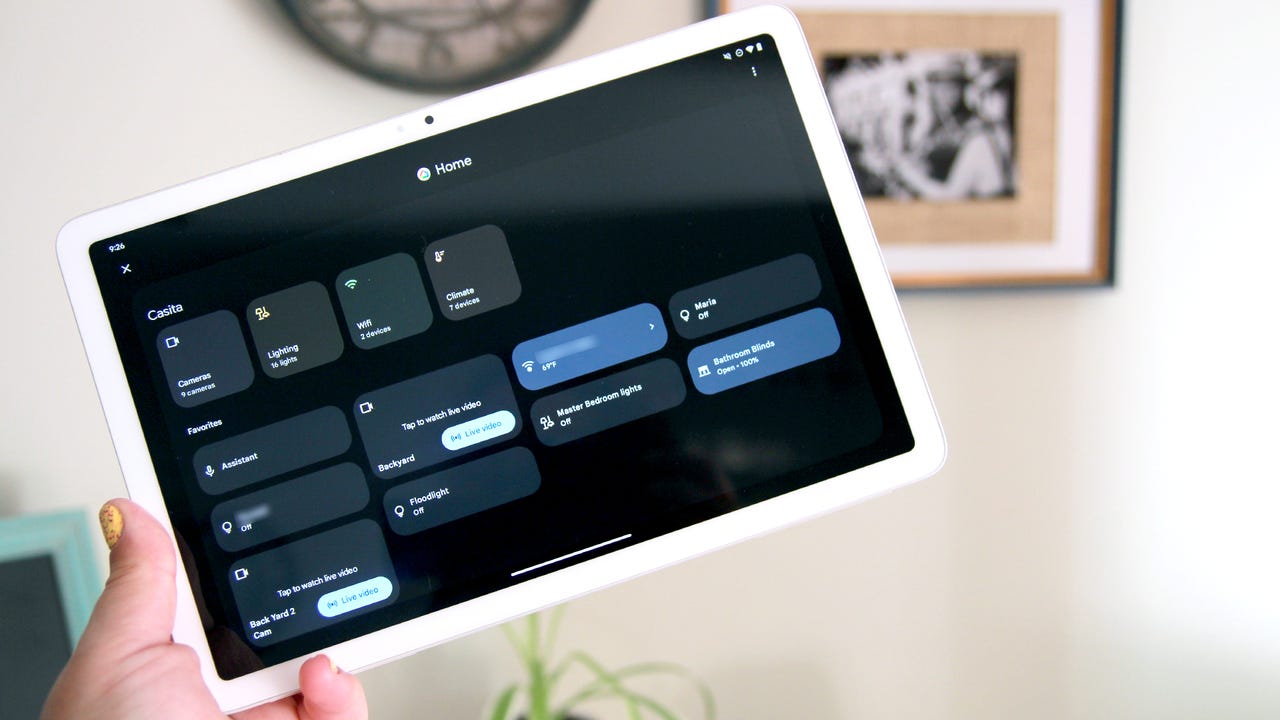
































The Google Home app on the Pixel Tablet.
Google is announcing the launch of Home APIs, giving developers access to more than 600 million devices with Matter or Works with Google support. This enables developers -- whether they're smart home device makers or mobile app developers -- to create smart home solutions for iOS and Android with Google Home integrations and automations.
In an expansion of its Matter infrastructure, Google also announced that Google TVs will become Google Home hubs and Matter controllers with local device control. Supported devices include Chromecast with Google TV, select Google TVs running Android 14+, and some LG TVs. Existing home hubs, like the Google Nest Hub, can also route commands locally to Matter devices for reduced latency.
Also: This robot mower looks like a racecar, but it mows a gorgeous lawn
Initial partners in the development of Android apps include ADT and Eve Systems. The latter plans to launch a highly anticipated Eve for Android app once the Google Home APIs are released publicly. The app will enable users to add and control Matter devices directly -- without requiring fragile cloud-to-cloud integrations
"The Google Home APIs turbo-charge the development of Eve for Android - they complement the set of tools that our teams need," said Eve CEO Jerome Gackel. "What has always set Eve apart is the seamless integration into the platform, without a cloud or proprietary technologies. Thanks to the Google Home APIs, we can deliver the same on Android, and we are proud to be moving forward hand in hand with Google."
The Eve for Android app will also provide energy consumption and generation insight for Eve Energy solutions, autonomous heating schedules for the Eve Thermo smart thermostat, and Adaptive shading for roller blinds from Eve Blinds.
Also: 9 biggest announcements at Google I/O 2024: Gemini, Search, Project Astra, and more
By opening its Home APIs, Google enables more developers to create advanced and customized smart home solutions. This makes it easier for everyday users to access and benefit from smart home technology, making it more mainstream.
With Home APIs, developers can offer users the same functionalities regardless of mobile platforms. This applies to smart home applications and other mobile apps. In the announcement, Google explained that developers can leverage Home APIs to integrate with delivery or fitness apps.
Some examples include connecting workout apps to control fans, vacation rental apps to adjust home settings for guests, and smart lock integrations for lighting control.
Also: These smart string lights can stay up all year and are cheaper than the competition
Developers must also pass a certification process to use the Home APIs. IOS applications will be able to adopt the Home APIs via Swift libraries.
The first apps using Home APIs will be available this fall. Google says Home APIs are available to these early access partners, with a waitlist for developers to sign up.
ADT, another early access partner, is leveraging Home APIs to implement a Trusted Neighbor feature that allows secure home access sharing.
 Hot Tags :
Home & Office
Hot Tags :
Home & Office